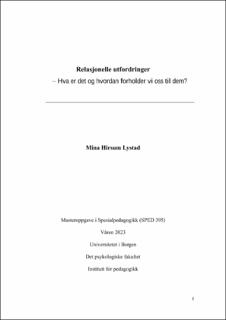| dc.contributor.author | Lystad, Mina Hirsum | |
| dc.date.accessioned | 2023-06-29T23:52:04Z | |
| dc.date.available | 2023-06-29T23:52:04Z | |
| dc.date.issued | 2023-05-15 | |
| dc.date.submitted | 2023-06-29T22:00:02Z | |
| dc.identifier.uri | https://hdl.handle.net/11250/3074603 | |
| dc.description.abstract | Denne masteravhandlingen undersøkte syv informanters forståelser av og tilrettelegging mot relasjonelle utfordringer for å besvare problemstillingen: Hvordan opplever grunnskolelærere relasjonelle utfordringer med elever på 1. til 4. trinn? Det er gjennomført kvalitative, semi-strukturerte forskningsintervjuer med induktiv tilnærming. Det vitenskapsteoretiske perspektivet er sosial konstruktivisme. Datamaterialet er bearbeidet ved hjelp av tematisk analyse. Hovedfunnet er at utagerende atferd oppleves som utfordrende. Alle informantene er innom både elevorienterte, systemorienterte og relasjonelle forklaringer på relasjonelle utfordringer. Imidlertid gis det flest eksempler på elevorienterte forklaringer (8), sammenlignet med systemorienterte (6) og relasjonelle (3). Videre beskriver informantene at det er variasjon både mellom lærere og skoler når det gjelder tilrettelegging mot relasjonelle utfordringer. Informantene forklarer at relasjonskompetanse avhenger av erfaring (n = 6), naturlige egenskaper (n = 4), menneskesyn, holdninger og verdier (n = 2) og engasjement (n = 4). Fem informanter beskriver at de ofte opplever mestring, mens to opplever det kun tidvis. Samtidig opplever seks informanter at de tidvis kommer til kort. Studien viser at relasjonelle utfordringer er et høyst aktuelt tema i grunnskolens første fire år. Det kan virke som anerkjente normer i samfunnet er bestemmende for grunnskolelæreres forventninger til elevers atferd, men at forståelser av relasjonelle utfordringer til syvende og sist defineres og konstrueres hos den enkelte grunnskolelærer. Samtidig er forutsetningene for å tilrettelegge mot relasjonelle utfordringer svake, på grunn av manglende fokus i utdanning og varierende skolekultur. Det kan virke som at det er behov for at sosial og emosjonell opplæring gis større plass i grunnskolen, relasjonelle utfordringer kvalifiserer til intensiv opplæring og grunnskolelærere får strategier for å inkludere og tilrettelegge mot relasjonelle utfordringer. Forslag til videre forskning er å utvide utvalget, undersøke hvilke forhold som fremmer og hemmer grunnskolelæreres forståelser av relasjonelle utfordringer og diskutere hvilken plass sosial og emosjonell opplæring skal få i grunnskolen. I tillegg kan det være nyttig å undersøke grunnskoleelevers opplevelser av relasjonelle utfordringer. | |
| dc.description.abstract | This master thesis examined seven informants’ understanding of and facilitation against relational challenges to answer the research question: How do primary school teachers experience relational challenges with pupils in grades 1 to 4? Qualitative, semi structured research interviews have been conducted with an inductive approach. The scientific theoretical perspective is social constructivism. The data material has been processed by means of thematic analysis. The study’s main finding is that externalising behavior is experienced as challenging. All the informants use pupil oriented, system oriented and relational explanations of relational challenges. However, the most examples are given of pupil oriented explanations (8), compared to system oriented (6) and relational (3). Furthermore, the informants claim that there is variation both among teachers and primary schools concerning facilitation against relational challenges. The informants explain that relational competence depends on experience (n = 6), character (n = 4), views on human nature, attitudes and values (n = 2), and commitment (n = 4). Five informants describe that they often experience that they are able to cope, while two experience it only occasionally. At the same time, six informants experience that they occasionally come up short. This study shows that relational challenges are a highly relevant topic in the first four years of primary school. It may seem that acknowledged societal norms determine primary school teachers’ expectations of pupils’ behavior, but that understandings of relational challenges are ultimately defined and constructed by the individual teacher. At the same time, the preconditions for facilitating against relational challenges are weak, due to a lack of attention given in education and varying school culture. It may seem that there is a need to pay more attention to social and emotional education in primary school, relational challenges to qualify for intensive education and primary school teachers to get strategies to include and facilitate against relational challenges. Suggestions for further research are to expand the sample, examine which conditions promote and inhibit primary school teachers’ understanding of relational challenges, and to discuss what place social and emotional education should have in primary school. In addition, it may be useful to examine primary school students’ experiences of relational challenges. | |
| dc.language.iso | nob | |
| dc.publisher | The University of Bergen | |
| dc.rights | Copyright the Author. All rights reserved | |
| dc.subject | grunnskole | |
| dc.subject | lærer-elev-relasjon | |
| dc.subject | tidlig innsats | |
| dc.subject | Relasjonelle utfordringer | |
| dc.subject | intensiv opplæring | |
| dc.subject | tilrettelegging | |
| dc.title | Relasjonelle utfordringer - Hva er det og hvordan forholder vi oss til dem? | |
| dc.title.alternative | Relational challenges - What is it and how do we relate to them? | |
| dc.type | Master thesis | |
| dc.date.updated | 2023-06-29T22:00:02Z | |
| dc.rights.holder | Copyright the Author. All rights reserved | |
| dc.description.degree | Masteroppgåve i spesialpedagogikk | |
| dc.description.localcode | SPED395 | |
| dc.description.localcode | MAPS-PED | |
| dc.description.localcode | MAPS-SPED | |
| dc.subject.nus | 724207 | |
| fs.subjectcode | SPED395 | |
| fs.unitcode | 17-42-0 | |
